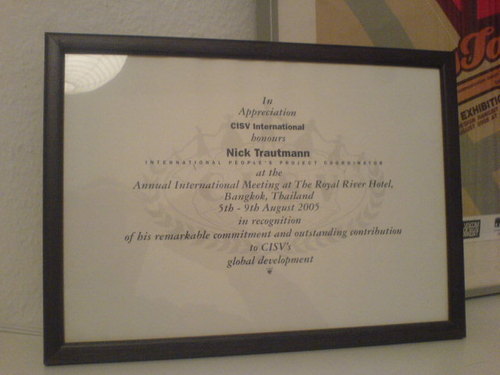Check out the latest issue of CISV news, which containts some interesting articles on how CISV is doing in Kenya and Vietnam. Also read about an NGO called Shinnyo-En Foundation, that conducted a workshop at CISV USA's national meeting. Also, it has a nice new layout!
February 2009 Archives

Anybody present at the AIM 2006 in Sweden will remember the silly superpower game that Bebbe and I started during preAIM, and made it all the way until the last day, when almost everybody had a silly superpower. A few days ago I discovered the following website:
Superuseless Superpowers - sounds familar, right?
I know I was Swapo-Man - the guy who could swap his superpower with anybody else. I also remember a few others:
- Femme Familiar, the girl that always looks like somebody you know.
- Captain Plancton - who could transform into plancton (who would want to??)
- Advisory Man - the hero that has the best advice - just 5 minutes too late.
 It's been a while since I've read De dagen van de bluegrassliefde (English: The days of bluegrasslove or in German: Spring wenn Du dich traust) by Edward van de Vendel (check his website). Although the word CISV never appears in his book, it tells the story of a boy who discovers his homosexuality in what obviously seems to be a CISV Village.
It's been a while since I've read De dagen van de bluegrassliefde (English: The days of bluegrasslove or in German: Spring wenn Du dich traust) by Edward van de Vendel (check his website). Although the word CISV never appears in his book, it tells the story of a boy who discovers his homosexuality in what obviously seems to be a CISV Village. Interesting, since homosexuality is an issue that appears in almost every camp (probably because of the quite contrary cultural acceptance), but never made into the Education Circle. (Or just maybe implicit in the "etc" in the prejudices section..?)
Related:
- A Devils' proposal that discusses gender in CISV
- "Focusing on Gender" an article in the Local Work Magazine 2005

For a long time I have wondered whether there is a connection between the economic situation in a specific country and the performance of the respective NA. The dramatic collapse of Argentina's currency about 8 years ago hit CISV Argentina so hard, they were hardly able to send anybody to international CISV programmes. The recent rise of China's economy is also nicely refelcted in its CISV participation.
Now these days the entire world is hit by a global financial crisis, that has lead to an economic recession. How will this affect CISV? Here are a number of assumptions:
- Company's may be reluctant to sponsor any CISV events
- With companies laying of workers and people losing their houses, less families will be willing to sponsor their kids CISV activities
- the general psychology "being in a crisis" will make people less willing to pay for their children's expensive summer holydays.
- Worrying about their financial future may leave less time to volunteer for a good cause.
On the other hand, certain effects could lead to more CISV participation, such as graduates, unable to find a job straight away, could be more willing to donate a summer to CISV. But all in all, I think that CISV is more likely to be positively correlated to the economic situation - therefore I predict, that CISV numbers will be going down. Since CISV international's finances heavily depend on the number of programmes hosted, important innovative projects may have to be cancelled, maybe even IO will have to reduce its costs. I don't want sound like a pessimist, but I think it would be better to be prepared before things start spiraling down.
Last week I heard a rumour, that even though the application deadline has passed, less than 100 people have signed up for AIM in Guatemala. If this is true, it may be the first reflection of the financial crisis in CISV.
Upon request you can now also subscribe to the comments of FTB.
The IMC now sends certifications to all Mosaic coordinators.
The IPP taskforce used to do this for all IPP participants and staff a few years ago - we gave up at some point because it was kind of a hassle. Also, we doubted, that anybody could use a certification issued from an organization to its own volunteers for future job applications. Personally, I received some sort of a certification when I finished my term as IPP chair (see below). But I never saw how I could have used it for anything, let alone to convince anybody to hire me. That's why I wonder whether this kind of a certificate is really of any value in society.

What I'd like to see in the future is an official valuation of volunteer work. I would like to have an account, to which "volunteer credits" are added by certified volunteer organizations. Of course you would need an extensive system of making sure somebody really donated time to a good cause. But anyway, I think it would be great to have my volunteer work properly measured and certified in my resume.
I thought I could remember an NGO providing exactly that, but my brief Internet search didn't reveal anything. Anybody up for starting such an organization?
(This reminds the that Sanna (SWE) once told me that one of the most popular talks at a Nordic Conference a few years ago was how to include CISV in your resume. How do you?)
The IPP taskforce used to do this for all IPP participants and staff a few years ago - we gave up at some point because it was kind of a hassle. Also, we doubted, that anybody could use a certification issued from an organization to its own volunteers for future job applications. Personally, I received some sort of a certification when I finished my term as IPP chair (see below). But I never saw how I could have used it for anything, let alone to convince anybody to hire me. That's why I wonder whether this kind of a certificate is really of any value in society.

What I'd like to see in the future is an official valuation of volunteer work. I would like to have an account, to which "volunteer credits" are added by certified volunteer organizations. Of course you would need an extensive system of making sure somebody really donated time to a good cause. But anyway, I think it would be great to have my volunteer work properly measured and certified in my resume.
I thought I could remember an NGO providing exactly that, but my brief Internet search didn't reveal anything. Anybody up for starting such an organization?
(This reminds the that Sanna (SWE) once told me that one of the most popular talks at a Nordic Conference a few years ago was how to include CISV in your resume. How do you?)
Non-governmental organisations you should know (NGOYSK), is a new section in this blog, where I will present organisations, that I find interesting and relate to the work of CISV.
So today I'd like to present Gapminder. Before I tell you anything, please, please, please, can you spare 20 minutes to look at this wonderful, wonderful, wonderful talk. In fact, I like to say, that this is probably the best, funniest and most entertaining presentation I have ever heard. Have you ever followed a lecture in your university, where the presenter sounded like a football world cup match commenter? Now watch:
The way I understand it, is that Gapminder offers a software and data that helps the world where development is happening, and where help is needed. As you can see from the video even well-educated people have wrong ideas on which countries are poor, undeveloped or even starving.
Now, Google offers the software to create those animated bubble graphics for free, so I decided to give it a try and created one for the development of CISV between 1998 and 2007 of the first 6 countries in the alphabet: Argentina, Australia, Austria, Belgium, Brazil and Bulgaria (data from the annual reports):
(Click here for a larger version)
Click the play button and you will see how CISV Austria increases their number of chapters (a structural reform) which is followed by a strong jump forward in hostiing and participation. Also you can see how Brazil grows strongly in the ninetees, but then continues to fall especially in the number of hosted camps while participation stays roughly the same. You may call me a statistical maniac, but I'd love to see somebody enter more countries and years into database and we'll watch how CISV developed globally in the past - in fact, I've enabled free-for-everybody-editing on the original spreadsheet, so if you like, you can add your country's numbers as well.
So today I'd like to present Gapminder. Before I tell you anything, please, please, please, can you spare 20 minutes to look at this wonderful, wonderful, wonderful talk. In fact, I like to say, that this is probably the best, funniest and most entertaining presentation I have ever heard. Have you ever followed a lecture in your university, where the presenter sounded like a football world cup match commenter? Now watch:
The way I understand it, is that Gapminder offers a software and data that helps the world where development is happening, and where help is needed. As you can see from the video even well-educated people have wrong ideas on which countries are poor, undeveloped or even starving.
Now, Google offers the software to create those animated bubble graphics for free, so I decided to give it a try and created one for the development of CISV between 1998 and 2007 of the first 6 countries in the alphabet: Argentina, Australia, Austria, Belgium, Brazil and Bulgaria (data from the annual reports):
(Click here for a larger version)
Click the play button and you will see how CISV Austria increases their number of chapters (a structural reform) which is followed by a strong jump forward in hostiing and participation. Also you can see how Brazil grows strongly in the ninetees, but then continues to fall especially in the number of hosted camps while participation stays roughly the same. You may call me a statistical maniac, but I'd love to see somebody enter more countries and years into database and we'll watch how CISV developed globally in the past - in fact, I've enabled free-for-everybody-editing on the original spreadsheet, so if you like, you can add your country's numbers as well.
A few weeks ago quite an interesting discussion took place over at the JB community list on the recent war in Gaza. Obviously a hard question to answer, whether this war was right or wrong, or how else the conflict could be solved, but I appreciated the amount of information that was added by all the participants of the discussion - especially all the newspaper sources that were aggregated.
I would like to see somebody create a "theme package" on the Middle East Conflict to be used in CISV camps, just like the WiFight package for youth meetings. Here's what I think the theme package should include:
- a range of newspaper articles featuring the history of the conflict
- a list of activities for various age groups
- questions for possible debriefings and discussions
The discussion thread could be the basis for all this, and the theme package could be assembled in JBPedia. It's all out there, just somebody needs to put it together. The Middle East Conflict is already something participants talk about in almost every camp - let's give it some more substance.
I would like to see somebody create a "theme package" on the Middle East Conflict to be used in CISV camps, just like the WiFight package for youth meetings. Here's what I think the theme package should include:
- a range of newspaper articles featuring the history of the conflict
- a list of activities for various age groups
- questions for possible debriefings and discussions
The discussion thread could be the basis for all this, and the theme package could be assembled in JBPedia. It's all out there, just somebody needs to put it together. The Middle East Conflict is already something participants talk about in almost every camp - let's give it some more substance.
